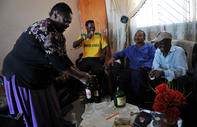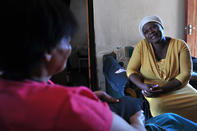A Volunteer at the Atlantis Integrated HIV/AIDS Network
When Linah Ncani first heard that there were people around her who were HIV-positive, she was scared. ‘I wouldn’t sit close to someone with HIV because I thought it was,’ she pauses to find the English words to explain her earlier confusion about the virus. ‘I thought HIV was flying in the air!’ She cackles at herself, remembering how things were at first.

But she did not want to chase these people away. ‘I wanted to open my arms to them,’ she says, spreading her reach wide, like wings, in the cool of her lounge, ‘so I wanted to educate myself.’ Now she is a volunteer with the Atlantis Integrated HIV/AIDS Network. She helps with the weekly support group meetings.
She counsels. She gives workshops. She visits people in their homes. She takes them food when they have nothing. Her next goal is to set up a satellite support group at the Witsand resource centre, a prefabricated rectangle about 200m down the road from her house, so that it is easier for Witsand people to get to the regular Wednesday meetings.
The stories she and fellow volunteer Rosaline Victor exchange, sitting there in Linah’s lounge one morning in the summer of 2012, are enough to make you shudder. Someone who was made to sleep outside in a hokkie (cage) when he was outed by his family.
People who will not eat food made by someone who is HIV-positive. Others who will not share spoons, knives or forks. People hiding away inside their homes to escape being ostracised, people running from the shame and the shunning.
Visiting Clients at Home

‘How are you, how do you feel?’ Linah will ask when she visits her ‘clients’ at home, always making a point of kissing them when she greets them, and wrapping them up in a full-bodied hug. But so many still shrink back, because they have been conditioned after all this time to believe that people do not want to touch you when you have this virus coursing through your body with each thump-shlup thump-shlup thump-shlup of the heart.
To help lift the depression she often finds huddled inside the shacks she visits – most of her clients live in shacks rather than in formal houses – she will swan in through the stale, oppressive air. ‘It’s hot in here!’ she will say, flinging the windows and doors wide. ‘It’s good to get up in the morning to get fresh air.’
But she is not flippant about the gloom that sets in for someone with no money, no job and the morbid feeling that comes with believing death is not far off. The volunteer work keeps Linah busy since she lost her job at one of the local clothing factories after the workers went on a strike in 2008. So she lives off a R1 140 per month disability grant (‘I’ve got diabetes, and high blood’), and gets another R250 each month for her eight-year-old son, Sibabalo.
Her late daughter, Noluvuyo, used to help her out with money, too, from time to time – she worked at the local Mondi factory – but now that money has dried up.
Once she sets up the local branch of the HIV/AIDS network, her clients here in Witsand will not have to trek all the way over to Atlantis for the Wednesday support meetings. It is a R12 round trip by taxi, or it takes an hour to walk, which generally leaves them wiped out by the time they arrive at noon.
Keeping the Message Alive
The network already has an old weathered shipping container set up outside the Witsand resource centre where the volunteers can meet to coordinate themselves and their work in the community. It would be nice to be able to bring the clients here for regular meetings, too. Inside, the walls of the shipping container are lined with hand-scribbled newsprint posters, tacked up with Prestik. How should we treat an HIV positive person? one poster asks in black koki pen.
Love, compassion, support of family and friends, a red koki answers. Let us use the correct language, another poster implores its readers. Beneath this, like a gospel choir singing a call-and-answer hymn, a red pen cries: A victim or sufferer. A black pen retorts: People living with HIV and AIDS. Red pen: Innocent or guilty. Black pen: We are all affected. Red pen: Killer disease.
Black pen: Life threatening illness. Red pen: Fight war against AIDS. Black pen: Response of HIV. Red pen: Sinful or guilty. Black pen: High risk behaviour. Red pen: High risk group. Black pen: We are all broken people.
The facts on HIV; what the programme’s projects are all about; the mission statement; the list of all the volunteers with their phone numbers; instructions for how to structure the regular volunteers’ meetings; reminders about counselling; the constant need for good nutrition; some note about a soup kitchen.
It is all there, tacked up on the wall so they do not forget why they are here, or what is expected of them. There is a reminder to the vegetable garden project manager about the requirements of the job: provide support and encourage the vegetable gardeners; organise training for vegetable growers; assist rural communities in the area to start food gardens.
Keeping the message alive about the need for good nutrition can be tough in a world so fatigued by the endless barrage of pain and suffering associated with HIV. Linah and her fellow volunteers keep at it though, instructing their clients on the importance of vegetables and a diverse diet. The other message they push hard is about good kitchen hygiene and food safety.
‘Wash your hands after going to the toilet,’ Rosaline interjects into Linah’s narration, miming the act of soaping her hands. But she tries not to over-emphasise hand washing after touching absolutely everything in the kitchen, because she does not want people to feel like they are dirty and contaminated. Good all-round nutrition, and making sure that food is sanitary, is critical both for people living in slums and for the HIV-positive.
By Leonie Joubert